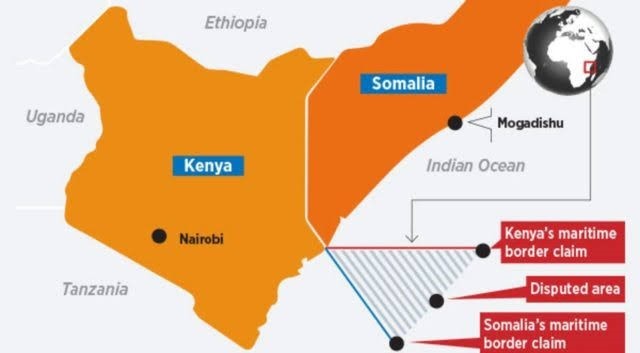CURRENT AFFAIRS
Get the most updated and recent current affair content on Padhaikaro.com
Border disputre in Indian between Kenya and Somalia
- IAS NEXT, Lucknow
- 12, Oct 2021

Kenya has said it rejected the jurisdiction of the United Nations International Court of Justice(ICJ) ahead of a ruling next week on its long-running maritime border dispute with Somalia.
- It said, as a sovereign nation, Kenya shall no longer be subjected to an international court or tribunal without its express consent.
What’s the issue?
The main point of disagreement between the two neighbours is the direction in which their maritime boundary in the Indian Ocean should extend.
Where is the disputed area?
- According to Somalia, the sea border should be an extension of the same direction in which their land border runs as it approaches the Indian Ocean, i.e. towards the southeast.
- Kenya, on the other hand, argues that the territorial southeast border should take a 45 degree turn as it reaches the sea, and then run in a latitudinal direction, i.e. parallel to the equator. Such an arrangement would be advantageous for Kenya, whose coastline of 536 km is more than 6 times smaller than Somalia’s (3,333 km).
Why is this area important?
The triangular area thus created by the dispute is around 1.6 lakh sq km large, and boasts of rich marine reserves. It is also believed to have oil and gas deposits.
About ICJ:
- ICJ was established in 1945 by the United Nations charter and started working in April 1946.
- It is the principal judicial organ of the United Nations, situated at the Peace Palace in The Hague (Netherlands).
- Unlike the six principal organs of the United Nations, it is the only one not located in New York (USA).
- It settles legal disputes between States and gives advisory opinions in accordance with international law, on legal questions referred to it by authorized United Nations organs and specialized agencies.
Structure:
- The Court is composed of 15 judges, who are elected for terms of office of nine years by the United Nations General Assembly and the Security Council. These organs vote simultaneously but separately.
- In order to be elected, a candidate must receive an absolute majority of the votes in both bodies.
- In order to ensure a measure of continuity, one third of the Court is elected every three years and Judges are eligible for re-election.
- ICJ is assisted by a Registry, its administrative organ. Its official languages are English and French.
The 15 judges of the Court are distributed in following regions:
- Three from Africa.
- Two from Latin America and Caribbean.
- Three from Asia.
- Five from Western Europe and other states.
- Two from Eastern Europe.
Jurisdiction and Functioning:
- ICJ acts as a world court with two fold jurisdiction i.e. legal disputes between States submitted to it by them (contentious cases) and requests for advisory opinions on legal questions referred to it by United Nations organs and specialized agencies (advisory proceedings).
- Only States which are members of the United Nations and which have become parties to the Statute of the Court or which have accepted its jurisdiction under certain conditions, are parties to contentious cases.
- The judgment is final, binding on the parties to a case and without appeal (at the most it may be subject to interpretation or, upon the discovery of a new fact, revision).